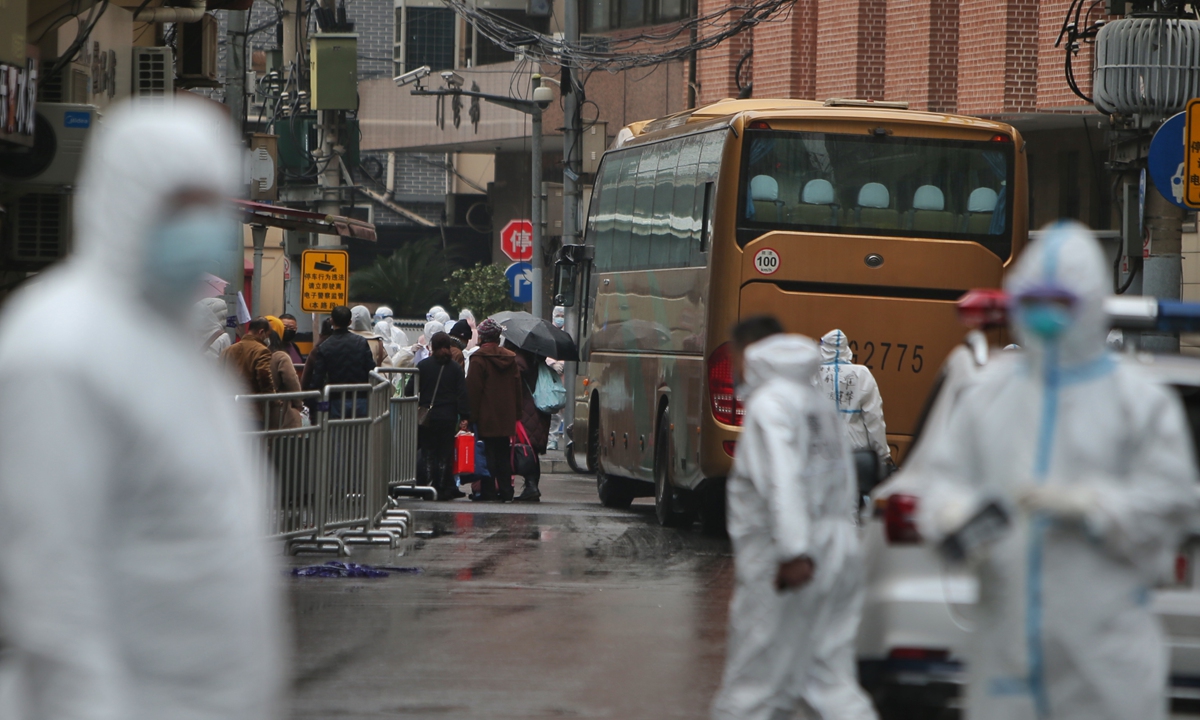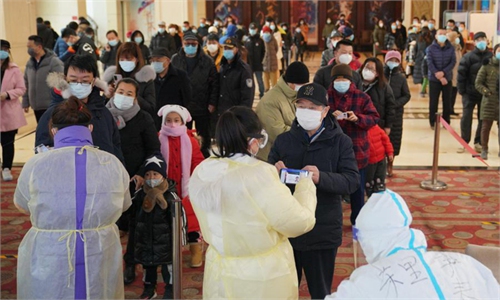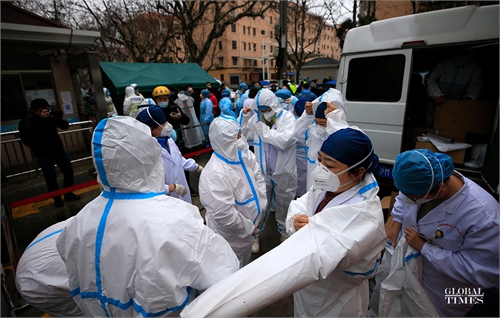Chinese netizens hail Shanghai's pet-friendly quarantine rule amid recent COVID-19 outbreak

Residents of Zhaotong residential area board buses to be taken to hotels for quarantine on Thursday in Shanghai, after their community was put under lockdown due to new COVID-19 cases. Photo: Yang Hui/GT
The Zhaotong residential area, where the confirmed cases live, was designated medium risk on Thursday in Shanghai. However, the neighborhood's outdated facilities and structures may cause problems in implementing closed-off management, prompting the municipal government to relocate those residents for central quarantine.
Chinese netizens found that residents queuing up to get into the buses taking them to the designated hotels for quarantine had brought luggage, groceries and also pets.
Residents are allowed to bring their pets to the centralized quarantine, a staff member from Shanghai district authorities, who preferred to remain unnamed, told the Global Times on Sunday.
"Heartwarming! Well done, Shanghai," one netizen wrote via Sina Weibo.
"Shanghai's move is quite people-friendly. My pet is my family and soul-mate. Awesome!" another said.
The policy in Shanghai has also won support in other cities. Beijing reported two more confirmed cases on Sunday, both of which were from the Ronghui residential community in Daxing district, which has been designated a high-risk region. Daxing has been sealing off communities and public venues to curb the virus spread.
Many residents who said they live near the community launched a "please allow pets to be brought during quarantine" hashtag campaign on China's Twitter-like Sina Weibo on Friday.
"People living in Daxing's Ronghui Community are required to have centralized quarantine but are forbidden from taking pets. I'm so angry … What should I do if my pet is not with me? What if they die at home?" one netizen posted on Weibo.
Another netizen gained a lot of sympathy after asking for help on Weibo. "I will spend anything as long as my pets are safe."
At a press conference on epidemic prevention and control on Sunday, Han Xinxing, deputy head of Daxing district, said that as some pets need to be taken care of, they agreed to allow one family member to stay at home while ensuring that the various epidemic prevention requirements are strictly implemented.
A staff member of the residential community in Tiangongyuan Ssreet in Daxing district confirmed this claim and told the Global Times that residents who are close contacts of confirmed cases are not allowed to take their pets to quarantine.
The Global Times reached the Zhaotong neighborhood committee in Shanghai, but they were all out working on the frontline and did not reply to the Global Times as of press time.
The other two medium-risk areas in Beijing's Shunyi district have not replied to the Global Times as of press time.
Sun Quanhui, a scientist from World Animal Protection told the Global Times that the controversy has existed since 2020, and the residents' hashtag campaign will further push local authorities to understand that they need to take further measures to protect pet's lives during quarantine.
The difference could be due to the different coronavirus risk levels in the two areas, Zhu Wei, a professor at the China University of Political Science and Law in Beijing, told the Global Times on Sunday.
"Beijing's Daxing district is a high-risk area while Shanghai's Zhaotong residential area is a medium-risk area," said Zhu.
"Local authorities must have their own reasons for launching this policy, and the locals should obey the rules for their own safety. Sending the pets to the pet care center could be the best option for pet owners," Zhu suggested, pointing out that taking pets to quarantine might increase their risk of becoming infected with COVID-19.
According to recent research from the Centers for Disease Control and Prevention, it appears that the coronavirus can spread from people to animals in some situations, "especially after close contact with a person with COVID-19."
Global Times




